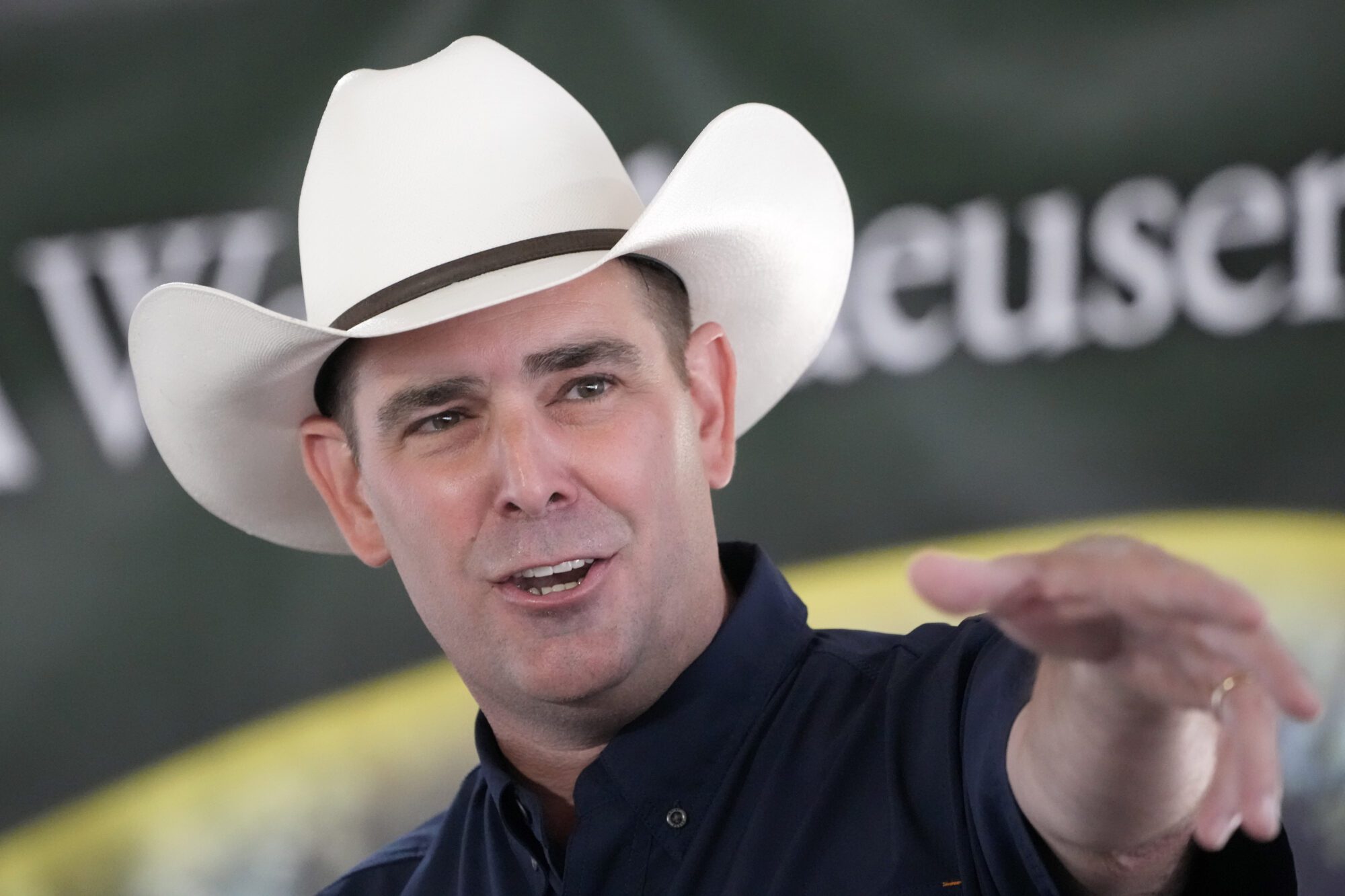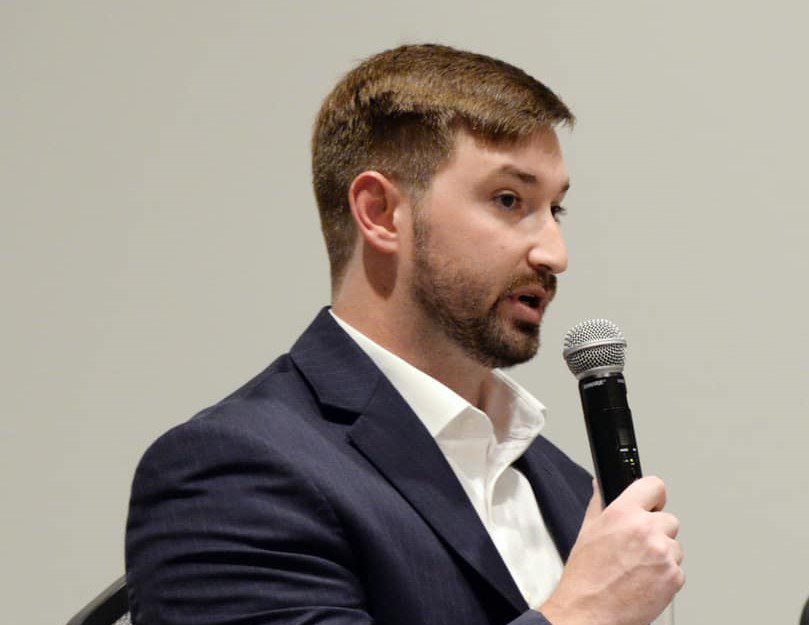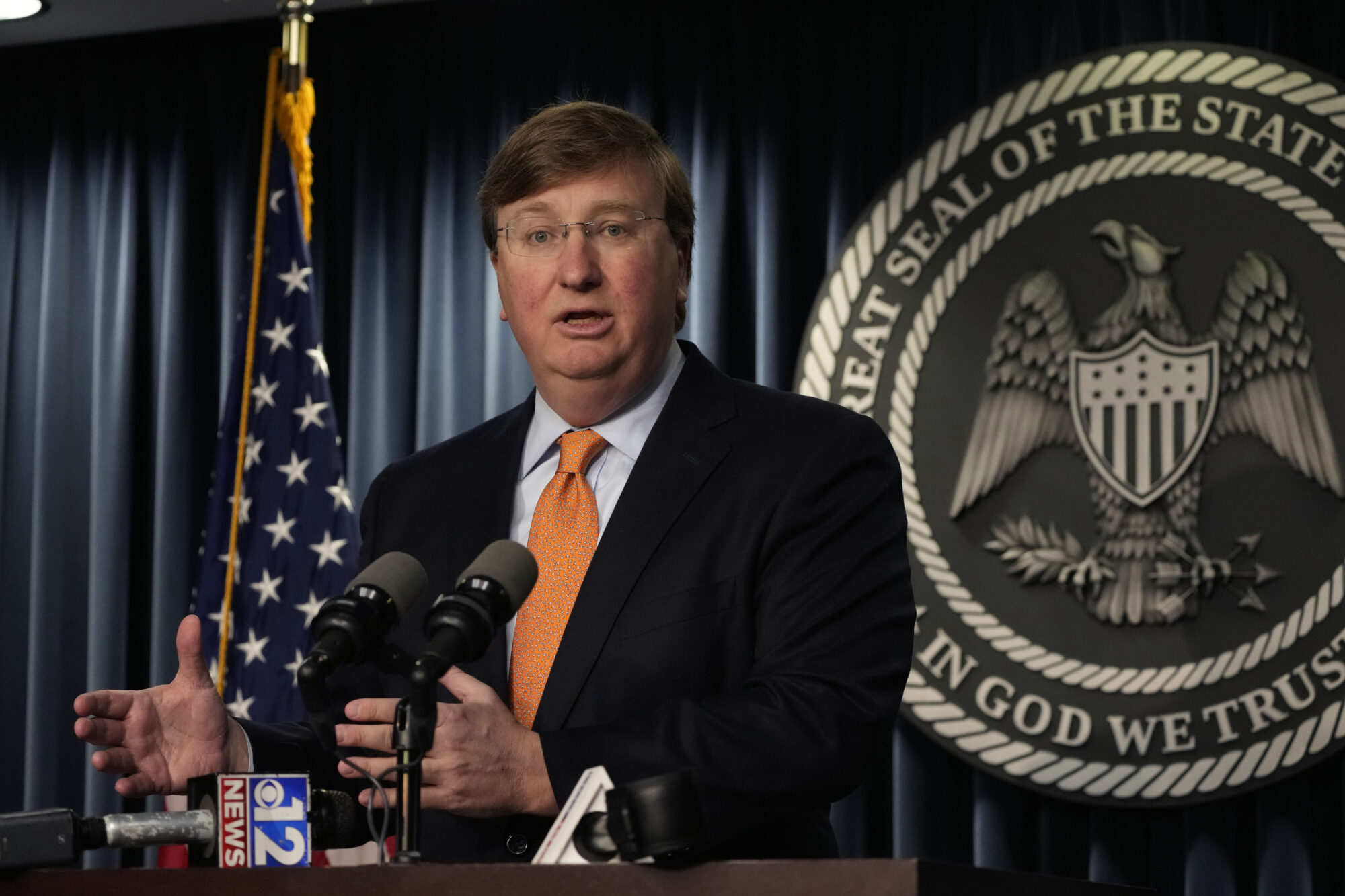
Fans stand by a banner showing the score with 2:12 remaining in February's Super Bowl 51, during the second half of an NFL football game between the New England Patriots and the Atlanta Falcons, Sunday, Oct. 22, 2017, in Foxborough, Mass. (AP Photo/Charles Krupa)
- The battle over whether or not to expand Medicaid in Mississippi reaches halftime with the contest still very much in doubt.
In Super Bowl LI, the Atlanta Falcons opened up a commanding 28-3 lead over the New England Patriots. TVs across America turned off. Giddy “Dirty Birds” fans high-fived and began ordering Super Bowl champions apparel.
Unfortunately for Atlanta, football games have four quarters and the Patriots had other plans. By the time the clock ticked to zero, Tom Brady’s boys had mounted an improbable comeback to win the title 34-28.
Passing legislation is a lot like playing football. There are phases of the game. Both the House and Senate must pass a bill independent of the other. Assuming there are disagreements, both chambers must reconcile those differences. If they can manage that, the governor gets to decide whether to sign or veto in the fourth quarter. If he vetoes, the game heads to overtime with the legislature deciding whether to override the veto. Along the way, there are jarring hits and unexpected bounces of the ball can quickly change the trajectory of the game.
When the Mississippi House of Representatives voted to fully expand Medicaid at the end of February, fans of the progressive policy started high-fiving in the streets. Producers at MSNBC’s Rachel Maddow Show ran congratulatory pieces. The Mississippi Democratic Party took to X, formerly Twitter, to dunk on Gov. Tate Reeves. Ole Miss professor James Thomas, who gained some public notoriety for comparing Trump supporters to Hitler youth, asked “did we turn Mississippi blue and just not know it?”
In a recent flurry, second place gubernatorial finisher Brandon Presley, who mounted his failed Democratic challenge to Gov. Reeves on the back of Medicaid expansion, wrote “you can write it down and etch it on concrete, Medicaid Expansion will happen in Mississippi this year,” before comparing himself to David slaying Goliath.
Proponents of Medicaid expansion may yet win the contest, but their celebrations are premature.
For starters, it seems they all assumed that Lt. Gov. Delbert Hosemann’s stated support of expansion meant that members of the Mississippi Senate were ready to act. In reality, many have been expressing concerns behind closed doors about the speed with which the Legislature is rushing into this, whether expansion will actually solve for the problems proponents claim, and the potential negative effects on the state budget, labor force participation, and the private health insurance market.
While Democrats in the Mississippi Senate stand ready and willing to vote to expand Medicaid, Republican commitments have been much harder to come by. To the credit of Lt. Gov. Hosemann and Senate Medicaid Chairman Kevin Blackwell, they seem to be searching for a more conservative alternative to the House plan. Both Hosemann and Blackwell have repeated multiple times in recent weeks that any expansion plan must be contingent upon the prior approval of a work requirement.
The House plan directed the Division of Medicaid to attempt to obtain a work requirement by September of this year from the Biden White House — a feat which no expert thinks is possible — and fully expands whether or not the work requirement is obtained.
Sen. Blackwell has also signaled that he does not want to disrupt the current private health insurance market. By expanding Medicaid up to 138 percent of the Federal Poverty Level (FPL), the House plan would kick more than 140,000 people off of private health insurance plans and force them onto Medicaid. In contrast, by going up to 99 percent of the FPL, Sen. Blackwell’s framework would provide Medicaid to working adults who are currently in the “coverage gap,” without disturbing the private insurance market.
While the Senate’s likely framework still amounts to a costly welfare expansion, far beyond the original scope of the Medicaid program, it does mitigate many of the risks of full expansion. It caps the potential of blowing through enrollment and cost estimates that has plagued other expansion states. It would actually be contingent on ensuring that new enrollees are working, thus reducing the very real risks to Mississippi’s workforce participation. It offers a path to cover uncompensated care without moving people off of private insurance that is accepted by more medical providers and which actually pays providers more than Medicaid can.
Of course, to date, no one has seen the Senate plan on paper. The deadline for the Senate to pass an expansion bill of its own came and went this past Thursday without a bill being brought to the floor. Sen. Blackwell indicated the Senate would do what’s called a “strike all” of the House’s Medicaid expansion plan and insert their own plan at a later date.
In the interim, Senators have been meeting both with the Governor and Lt. Governor.
In addition to assuming the Senate would just go along with Medicaid expansion, proponents initially underestimated Reeves’ resolve. Capitol whispers that Reeves might ultimately back down have faded, though, as the Governor has communicated to Senators that he will veto Medicaid expansion if it makes it to his desk and has been vocal in rallying opposition to the policy.
In a public post on Friday, Reeves did give Senate leadership credit “for not rushing head first into expansion.” Reeves also noted that “recognizing the need for a true work requirement is a good first step,” before concluding that “any day when the votes aren’t there to enact Joe Biden’s preferred welfare policies is a good day for Mississippi.”
We’re at halftime. The early lead held by full expansion proponents has seemingly been erased. Let’s see how the ball bounces moving forward.










